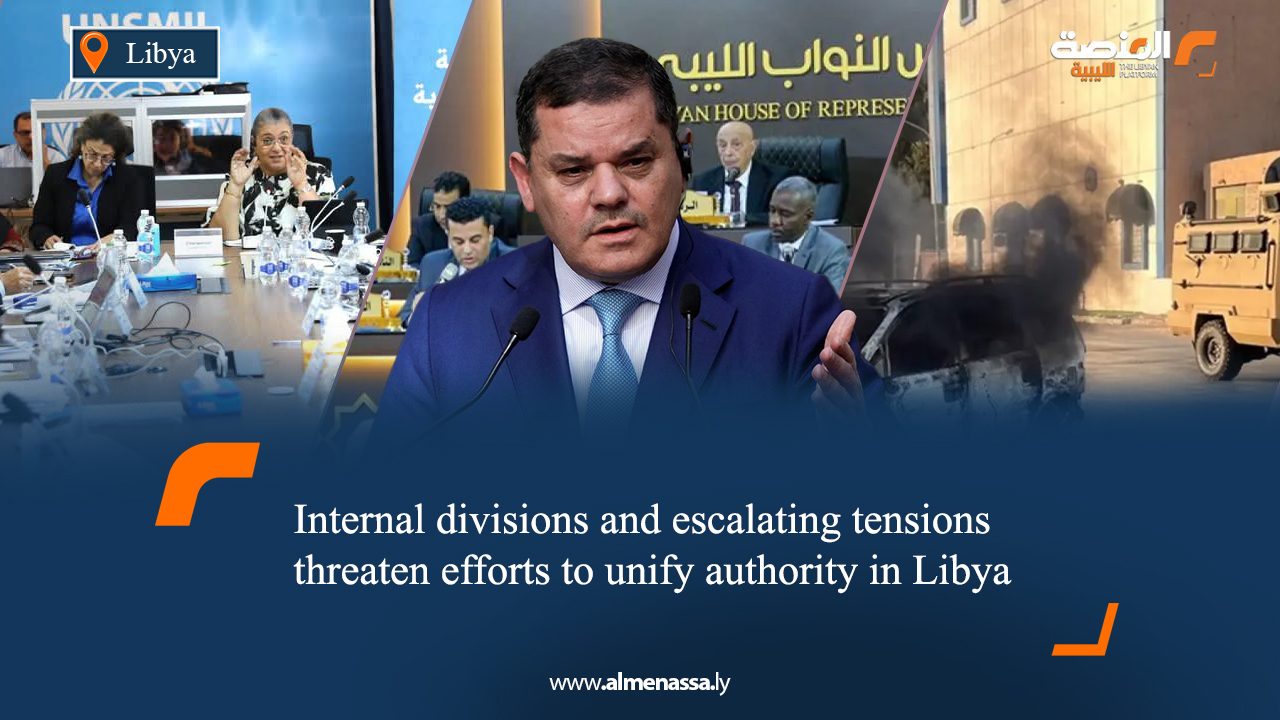Political developments in Libya are accelerating amidst a state of deadlock and fragmentation. The intensity of statements and declarations from various local parties has escalated, paralleled by increasing regional and international movements aimed at forging a way out of the crisis. However, these efforts face broad rejection from Libyan actors who view them as interventions that destabilise national unity and entrench existing divisions.
Bani Walid forum rejects ‘fragile legitimacies’
In the city of Bani Walid, the Libyan Activities Forum, convened by the Warfalla tribes, concluded with a decisive final statement. Participants in this declaration announced their complete rejection of the current political legitimacies, describing them as “fragile and eroded.” They affirmed their non-recognition of any entity “feeding on foreign crumbs,” an expression reflecting their rejection of external interference.
The statement emphatically rejected what it termed “the rule of hotels and foreign intelligence,” declaring its full alignment with “Option Four” among the proposals put forth by the United Nations Support Mission’s advisory committee, deeming it the only viable path to end the crisis.
The forum called for the formation of a constituent committee to assume the responsibilities of current political bodies, and for the Chief Justice of the Supreme Court to manage a transitional phase leading to presidential and parliamentary elections. The statement demanded the restoration of national will and the rejection of all forms of foreign intervention.
Political parties’ coordination group denounces ‘suspicious’ interventions
In a related context, the Coordination of Political Parties and Blocs issued a strongly worded statement, rejecting the actions of “non-Libyan institutions,” particularly the “Humanitarian Dialogue Centre” in Geneva. The Coordination accused the centre of proposing “parallel and suspicious initiatives” aimed at obstructing the advisory committee’s outcomes and deepening the Libyan crisis.
The Coordination urged the Libyan people to rally around genuine national proposals and reject any external interference that seeks to re-engineer the crisis in a new form.
Tension within official institutions as Al-Mishri meets candidates
In a parallel development, tension escalated within Libya’s official institutions. The Presidency of the High Council of State formally denied the validity of endorsements attributed to its members regarding nominations for the new government’s premiership.
The Council affirmed that it does not recognise any nominations or communications made outside approved legal and official frameworks, stressing that the review of nomination files occurs only during quorate sessions and under the supervision of the Presidency.
The Council also rejected the adoption of any endorsements attributed to it by external parties, including the House of Representatives, unless they are documented by official and transparent minutes.
Despite this official rejection, the High Council of State’s headquarters in Tripoli witnessed a meeting between the Council’s President, Khaled Al-Mishri, and a number of candidates for the new government’s premiership. This meeting took place after their endorsements were referred to by the House of Representatives.
The meeting was attended by the Council’s Second Deputy President and several officials, where challenges facing the elections and steps towards forming a unified government were discussed. An emphasis was placed on reviewing the submitted endorsements before the end of the current week.
Unified government in Sirte and constitutional concerns
For his part, House of Representatives member Abdul Monem Al-Arfi stated that consultations for forming a unified government between the House of Representatives and the High Council of State have reached advanced stages, with support from the UN mission. Al-Arfi suggested that the seat of the new government might be outside the capital, Tripoli, specifically in Sirte, due to the control of armed groups over the capital.
The Constituent Assembly for Drafting the Constitution has also entered the crisis fray. Its head, Mrajaa Noah, accused the UN mission of “ignoring” the draft constitution and failing to put it to a referendum. Noah argued that continued disregard for the constitutional path exacerbates the complexity of the political landscape. He stressed the importance of preventing discrimination among Libyans in candidacy and elections, warning against reliance on “non-Arab” foreign powers.
Security situation and future challenges
Commenting on the security situation, State Council member Ahmed Homoma affirmed that the capital Tripoli has witnessed a haphazard growth of armed militias in recent years, backed by tribal and regional support. He indicated that these groups have become a “stick used against the government itself.”
Homoma stated that security stability is a fundamental prerequisite for political and economic progress in Libya, calling for the disbandment of these armed formations and their integration into state institutions or their complete dissolution.
Amidst all these complex developments, efforts to unify institutions and form a new government face immense challenges. Foremost among these are deep internal divisions, the influence of armed factions, and conflicting local and international agendas. All this transpires while the Libyan public awaits genuine and tangible steps towards stability, far from the prolonged cycle of procrastination and narrow interests.


